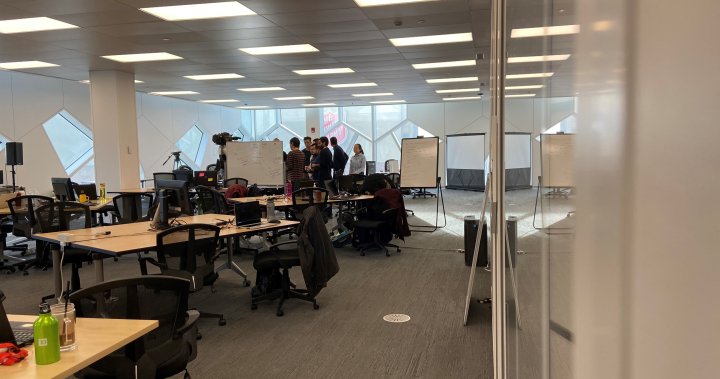As a teenager, Danielle Barker was always drawn to all things technology, especially software development. She knew she wanted to be in the technology sector, but was wary of pursuing it as a career.
“I saw it as a male-dominated industry and any time that’s the situation, trans people struggle to fit in and feel like they’re part of the team,” Barker said.
Danielle Barker was a student at InceptionU and is now an employee.
Jill Croteau/Global News
But she persevered and took classes at InceptionU, an organization that offers courses in the industry for individuals and corporations.
“It was like a dream come true,” Barker said.
She was so impressive and dedicated that she was hired as a technical facilitator supporting students.
“You never know what you’re going to come up against. I’ve struggled a lot, but it’s encouraging to see the direction things are going,” said Barker.
Read more:
More than 100,000 people are transgender in Canada, 2021 census shows
Read more
-
![]()
More than 100,000 people are transgender in Canada, 2021 census shows
InceptionU founder Margo Purcell said it was a natural fit to bring Barker to the team.
“Danielle just showed us who she is. She was such a generous person with her fellow learners and still is. She is so eager to learn and curious – how could I not have her as part of the team?” Purcell said.
Purcell said the potential for productivity and profitability is something their organization is taking advantage of and hopes others work to create a culture of diversity.
“The limitations that happen when someone can’t be their whole self, the cognitive energy that goes into being careful about what I say, who I am — it takes away from them doing really great work,” Purcell said.
InceptionU founder, Margo Purcell.
Jill Croteau/Global News
“I didn’t consider the toll it takes on people … to create an environment where they can be their whole selves, which can unleash so much potential to recruit and retain top talent,” Purcell said.
“It’s about building better technology. Better technology includes the diverse perspective and experiences of all kinds of people.”
Class at InceptionU.
Jill Croteau/Global News
But there is another way to go about inclusivity in technology.
According to a recent poll for Queer Tech, conducted by the Kapor Center for Social Impact, 33 percent of LGBTQ2S+ respondents have experienced harassment in the workplace, with 57 percent reporting that they cannot be “fully out” at work not. Fifteen percent of LGBTQ2S+ people in Canada’s tech sector feel their career opportunities are limited because of how they identify.
Read more:
How employers can make their LGBTQ2 employees feel welcome and close the wage gap
Amber Rowden started Queer Innovation YYC. It’s a safe space for strangers to make industry connections.
“I first started out in tech and didn’t feel safe coming out as myself. I didn’t want to be known as queer,” Rowden said.
Amber Rowden, creator of Queer Innovation yyc.
Jill Croteau/Global News
“It becomes difficult to pretend and have a facade and there is self-doubt. If you’re yourself, you’re excited and you can work together.”
She created the group with the help of friend Ty McKinney. He said it helped the community embrace possibilities.
“It’s just a matter of finding opportunities and you only get them in a safe space where you can be yourself,” McKinney said. “If there’s a constant pressure to conform to be hetero-normative, you don’t feel like you can pursue those opportunities.”

McKinney has his own startup company and said he’s noticing a shift.
“The status quo is changing and everyone is part of the solution.”

© 2022 Global News, a division of Corus Entertainment Inc.


